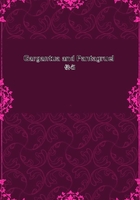
第217章
How Rondibilis declareth cuckoldry to be naturally one of the appendances of marriage.
There remaineth as yet, quoth Panurge, going on in his discourse, one small scruple to be cleared. You have seen heretofore, I doubt not, in the Roman standards, S.P.Q.R., Si, Peu, Que, Rien. Shall not I be a cuckold? By the haven of safety, cried out Rondibilis, what is this you ask of me? If you shall be a cuckold? My noble friend, I am married, and you are like to be so very speedily; therefore be pleased, from my experiment in the matter, to write in your brain with a steel pen this subsequent ditton, There is no married man who doth not run the hazard of being made a cuckold. Cuckoldry naturally attendeth marriage. The shadow doth not more naturally follow the body, than cuckoldry ensueth after marriage to place fair horns upon the husbands' heads.
And when you shall happen to hear any man pronounce these three words, He is married; if you then say he is, hath been, shall be, or may be a cuckold, you will not be accounted an unskilful artist in framing of true consequences. Tripes and bowels of all the devils, cries Panurge, what do you tell me? My dear friend, answered Rondibilis, as Hippocrates on a time was in the very nick of setting forwards from Lango to Polystilo to visit the philosopher Democritus, he wrote a familiar letter to his friend Dionysius, wherein he desired him that he would, during the interval of his absence, carry his wife to the house of her father and mother, who were an honourable couple and of good repute; because I would not have her at my home, said he, to make abode in solitude. Yet, notwithstanding this her residence beside her parents, do not fail, quoth he, with a most heedful care and circumspection to pry into her ways, and to espy what places she shall go to with her mother, and who those be that shall repair unto her.
Not, quoth he, that I do mistrust her virtue, or that I seem to have any diffidence of her pudicity and chaste behaviour,--for of that I have frequently had good and real proofs,--but I must freely tell you, She is a woman. There lies the suspicion.
My worthy friend, the nature of women is set forth before our eyes and represented to us by the moon, in divers other things as well as in this, that they squat, skulk, constrain their own inclinations, and, with all the cunning they can, dissemble and play the hypocrite in the sight and presence of their husbands; who come no sooner to be out of the way, but that forthwith they take their advantage, pass the time merrily, desist from all labour, frolic it, gad abroad, lay aside their counterfeit garb, and openly declare and manifest the interior of their dispositions, even as the moon, when she is in conjunction with the sun, is neither seen in the heavens nor on the earth, but in her opposition, when remotest from him, shineth in her greatest fulness, and wholly appeareth in her brightest splendour whilst it is night. Thus women are but women.
When I say womankind, I speak of a sex so frail, so variable, so changeable, so fickle, inconstant, and imperfect, that in my opinion Nature, under favour, nevertheless, of the prime honour and reverence which is due unto her, did in a manner mistake the road which she had traced formerly, and stray exceedingly from that excellence of providential judgment by the which she had created and formed all other things, when she built, framed, and made up the woman. And having thought upon it a hundred and five times, I know not what else to determine therein, save only that in the devising, hammering, forging, and composing of the woman she hath had a much tenderer regard, and by a great deal more respectful heed to the delightful consortship and sociable delectation of the man, than to the perfection and accomplishment of the individual womanishness or muliebrity.
The divine philosopher Plato was doubtful in what rank of living creatures to place and collocate them, whether amongst the rational animals, by elevating them to an upper seat in the specifical classis of humanity, or with the irrational, by degrading them to a lower bench on the opposite side, of a brutal kind, and mere bestiality. For nature hath posited in a privy, secret, and intestine place of their bodies, a sort of member, by some not impertinently termed an animal, which is not to be found in men.